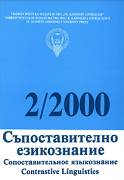
We kindly inform you that, as long as the subject affiliation of our 300.000+ articles is in progress, you might get unsufficient or no results on your third level or second level search. In this case, please broaden your search criteria.



Review of: П. Пашов. Българска граматика. Издателска къща „Хермес“. Пловдив, 1999. 455 стр.
More...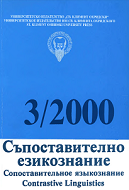
The purpose of this article is to show what changes occur when translating children’s fiction from a formal gender system language into a semantic gender system language and vice versa. Children’s fiction was chosen for the abundance of examples that it provides and for the vividity of those examples. Moreover, in this type of fiction, the presence and the type of gender are often more than significant and so the rendition of one and the same text from one language into another poses interesting and challenging problems for the translator. Now I will briefly present two opinions on the gender systems of languages.
More...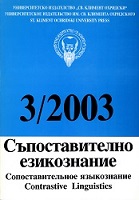
В уводната част на изследването се представят контрастивните изследвания на езиците в контакт, особено на родствените езици. Накратко се проследяват досегашните контрастивни проучвания и контрастивни проекти на хърватския и словенския език. Основната част на труда съдържа контрастивно описание на хърватския и словенския език на следните нива: фонетично-фонологично (системи на вокалите, сонантите, консонантите и ударенията), морфологично ниво (падежи, сравнителна степен на прилагателните, глаголни форми), синтактично ниво (място на енклитиките), лексикално (омоними) и правописно ниво (графемни системи). Близостта между хърватския и словенския език налага подчертано контрастивен подход при изучаването и представянето на езиците (контрастивни таблици); само този подход дава възможност за съзнателно предотвратяване и поправяне на упоритите интерферентни грешки на всички езикови нива. Накрая се привеждат теоретичните и приложните резултати от контрастивните проучвания, които допринасят за по-успешното преподаване/изучаване не само на хърватския и словенския език, но и на други славянски езици.
More...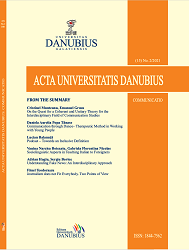
This essay deals with inter-, pluri- and transdisciplinarity, taking as a point of departure some studies written by scholars such as Eugenio Coseriu, Stéphane Lupasco, Basarab Nicolescu, Petru Ioan. Aware of the crisis encountered by modern epistemology, Ioan S. Cârâc states that semiotics can pilot the other sciences in the future. In order to choose a way that leads to studying reality as an unfragmented whole, one needs to switch the analytical mode of thinking, specific to traditional science, with the synthetical mode of thinking. In other terms, semiotics (the science of signs) could impose a transdisciplinary logical method which is meant to disentangle modern epistemology. Ioan S. Cârâc tries to prove that semiotics should be essentially a unitary and transdisciplinary theory and, consequently, he finds within the Romanian culture possible solutions for establishing such an integral semiotics: that is, Eugenio Coseriu’s integral linguistics, along with some theoretical ideas belonging to the logician Petru Ioan, who elaborated a hexadic model of the “semiotic situation”, envisaging semiotics as a syntax semantically and pragmatically justified.
More...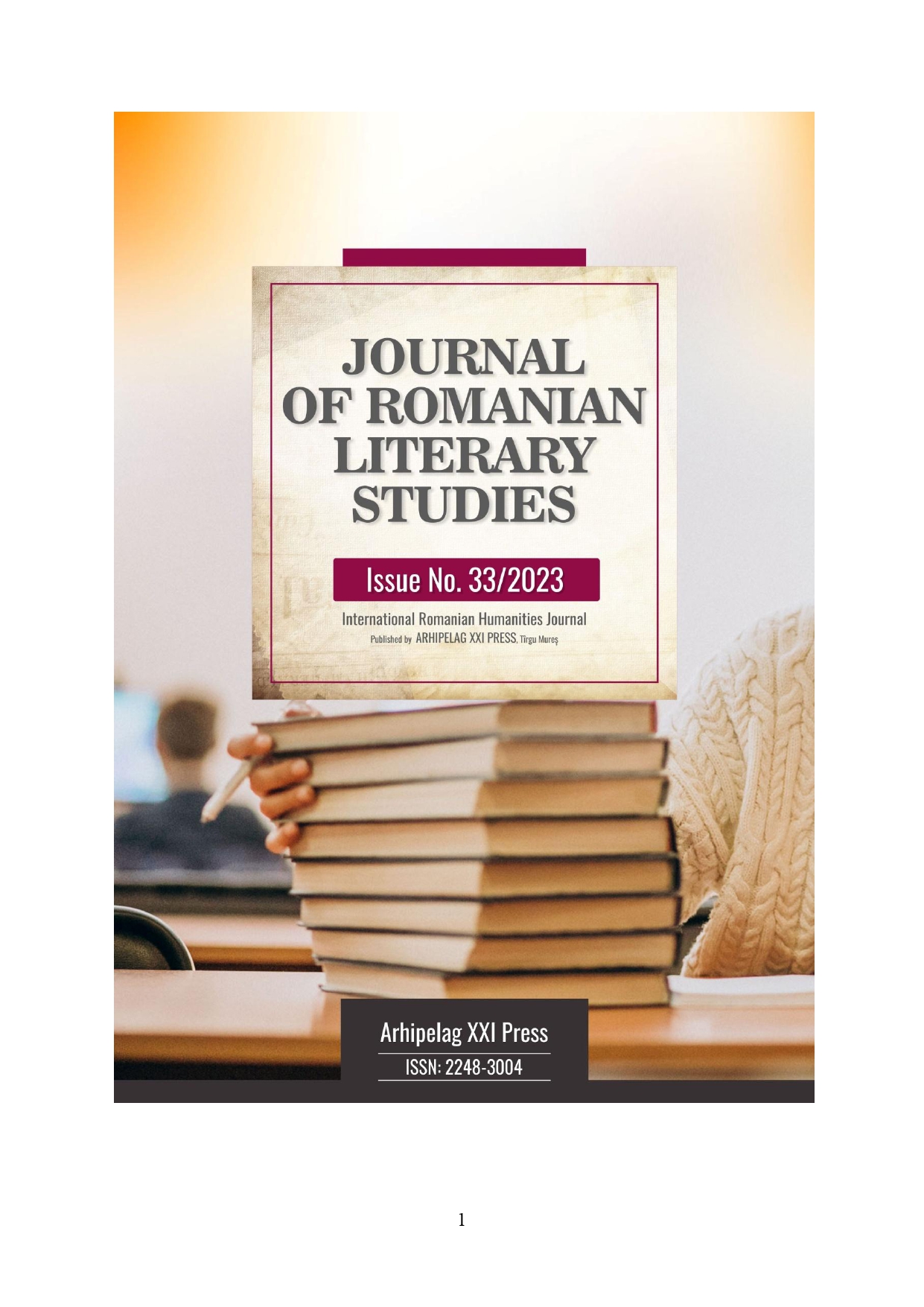
The concept of equivalence is one of the most frequently used theoretical terms in the area of translation studies. However, in spite of its being so widely employed, it is still a concept which is rather difficult to pin down and define accurately. While some theoreticians equate equivalence to the practice whereby the target text achieves an identical function to the source text, others speak about the degree of replication of the textual situation in the source text by means of different wording in the target text. Yet other theoreticians talk about the transfer of meaning between source and target text, while others define equivalence as the act of replicating in the target text the most similar natural equivalent of the source language meaning. Last but not least, some theoreticians believe that perfect equivalence does not, in truth, exist. In the present paper we have attempted to reconcile all these diverging views on equivalence, by discussing such concepts as freedom in translation, level, genre, audience, lexicon, hierarchy, ellipsis and compensation.
More...
The evolution of ideas and facts in library science is due, as in other fields, to some personalities, because a field cannot exist in time if it does not have behind it those pillars on which a vocabulary or terminological language can be created. The terms from the biblio-economic lexicon are grouped into lexical systems, isolated from the words from the common lexicon, and are correlated with other objectual-notional fields. The article presents an analysis of the structure of the terms in the field of Romanian library terminology is generally mentioned as one of the main methods of researching terms in linguistics. Insights derived from statistical accounts of a domain's vocabulary can be useful in solving and clarifying specific qualitative and quantitative problems regarding language use. In the linguistic research regarding the library terminology, we rely on the information extracted from specialized publications, the research is about the 17452 grammatical terms and phrases.
More...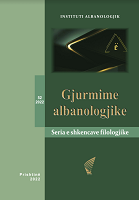
Sivjet është 100-vjetori i lindjes së gjuhëtarit austriak Hermann Ölberg, një vijues i shquar i shkollës albanologjike të Austrisë, ku spikatin emra të mirënjohur si Johann Georg von Hahn, Gustav Meyer, Franz Miklosich, Norbert Jokl, Rajko Nahtigal, Maximilian Lambertz, dhe që vijon edhe sot me studiues të rinj në fusha të ndryshme të studimeve albanologjike. H. Ölberg-u kishte studiuar për gjuhësi indoeuropiane në Universitetin e Innsbrukut, ku zhvilloi më pas gjithë veprimtarinë e tij mësimore e shkencore, në fillim si lektor i gjuhës esperanto (1953), pastaj pedagog i sllavishtes së vjetër kishtare (1963), ndërsa më 1972 docent dhe prej vitit 1975 profesor i gjuhësisë së përgjithshme dhe të zbatuar, derisa doli në pension (1987). Si studiues dhe profesor ai ishte përpjekur të zgjeronte rrethin e kërkimeve me tema e drejtime të reja, të bashkëpunonte me specialistë të disiplinave të ndryshme të gjuhësisë dhe të kombinonte trajtimet gjuhësore me vështrime historike e kulturore, duke hyrë në një shkëmbim të frytshëm e të shumanshëm idesh e metodash. H. Ölberg-u jetoi gjatë, 95 vjet (u nda nga jeta më 25 shkurt 2017), por mjerisht vitet e fundit i kaloi në trishtim, pasi humbi dritën e syve.
More...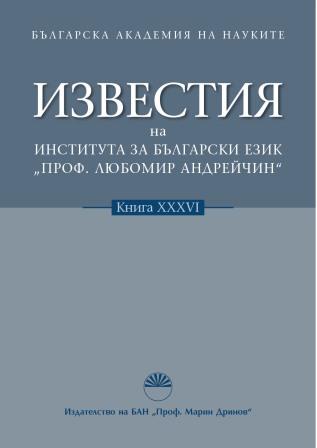
The article aims at describing a specific variety of perception predicates, namely active perception predicates. Active are considered those predicates in which the perceiving subject voluntarily directs his attention or sense organs to the object of perception. The differences between the analyzed predicates and the other subclasses of perception verbs are investigated, their semantic scope is described. Active perception predicates are categorized into subtypes. Their frame elements are examined with their definitions, semantic restrictions and possible syntactic realizations.
More...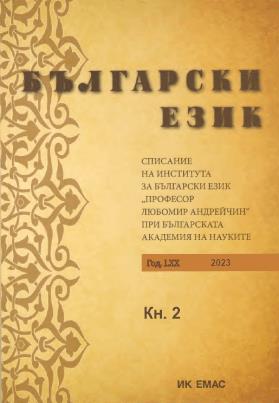
The article presents novel approaches to enhancing syntactic analysis with a view to the modernisation of Bulgarian language teaching by means of configurational syntactic analysis and structurographically parsed sentences. The study of texts by three Bulgari-an authors enables the measurement of percentage ratios of the functions of the con-stituents of simple sentences and the types of subordinate clauses in complex-compound sentences. Statistically significant data regarding the range and depth of the structure of simple and complex sentences are also presented, along with intonograms implemented in the Praat acoustic analysis programme. The integrated analytical mod-el is applicable both in fundamental grammar research and in devising entertaining practical exercises for school and university-level students.
More...
The article analyses cases in Bulgarian where punctuation errors occur as a result of failure to distinguish between homogeneous and detached parts of the sentence. The author discusses in more detail punctuation errors involving expressions connected by means of the conjunctions както, както и.
More...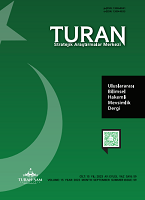
In order to follow the historical development of Turkish Dialects, it is of great importance to investigate the grammatical features of texts from the old and middle centuries. Kul Ali’s work “Kıssa-i-Yusuf” is one of such texts. Determining the morphological and syntactic features of 13th century Azerbaijani Turkish and visualizing the language landscape of the period also helps to learn the development path of word types, groups and sentence types that existed in Azerbaijani Turkish in the past. In the research, conjunctions and prepositions in the language of Kul Ali’s work “Kıssa-i-Yusuf” were classified according to their functions and meanings, based on the grammatical features of modern Azerbaijani Turkish and the old usage forms of the mentioned word types were mentioned. It has been determined that the conjunctions and prepositions used in modern Azerbaijani Turkish are used in the same or different phonetic variants in the language of “Kıssa-i-Yusuf”.
More...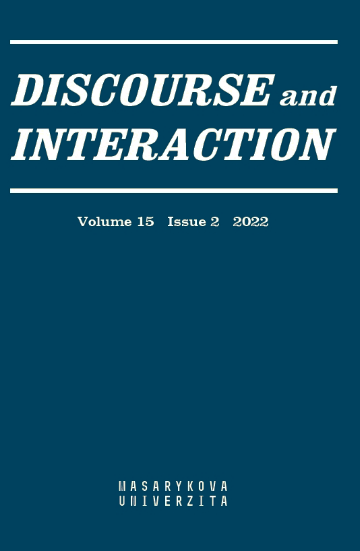
Information technology (IT) professionals are a specific discourse community whose oral communication in English as a second language (ESL) predominates at all levels of workplace activities in the multinational IT sector. Since IT students’ pragmatic competence in performing communicative functions is essential for their effective communication in an academic setting and a global work environment, it is important to investigate this aspect of their language systematically and carefully. This paper focuses on IT students’ speech acts and the ways they modify the illocutionary force while participating in in-class debates. The analysis revealed that students used a wide range of speech acts and different metadiscourse markers for both increasing and reducing the illocutionary force. The ways IT students used boosters and hedges also reflect how they assume and share their professional knowledge and experience in their discourse community.
More...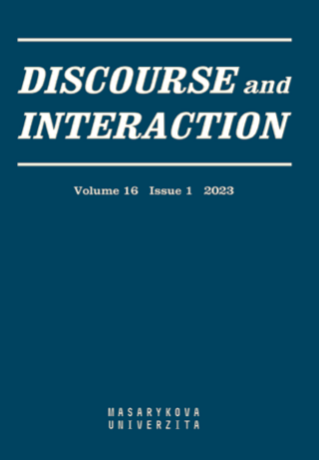
This paper examines the rhetorical strategies of mobilising and inspiring a domestic audience for national identity re/construction in order to reinforce the Nigerian brand. Data for the study are composed of some branding strategies packaged and broadcast mainly on radio and television by Nigeria’s Federal Ministry of Information and Communications in its rebranding campaign in 2009 which was targeted at domestic citizens’ value re-orientation. The study adopts Fairclough’s (1992) dialectical-relational approach which centres on “dialectical reasoning” – a way of reasoning from critique of discourse to what should be done to change the existing reality, by way of explanation of relations between discourse and other components (social, cultural and political) of reality. It then applies the tenets of the theory to analyse the rhetorical strategies in the rebranding campaign, as the domestic citizens’ agency is considered instrumental in bolstering the Nigerian brand. The study demonstrates that the branding strategies analysed largely invoke history, collective memory, values, traditions, and aspirations which could appeal to domestic citizens’ nationalistic sensibilities and imaginaries to evolve an enduring Nigerian brand which is domestic driven.
More...
This study examines the interdiscursive representation of the coronavirus disease by the World Health Organization from the outbreak of the virus in January 2020 to the announcement of a successful vaccine in November 2020. The aim is to find out whether the agency has delivered apocalyptic language that increased anxiety and stress among the public leading to a weak human immune system, or contributed to creating global cooperation and placing emergency measures to fight the virus. I have adopted a discourse analysis approach, with the aid of NVivo qualitative software and corpus linguistic tools, for the analysis of a purpose-built corpus of the WHO Director-General’s speeches, focusing on referential, predication, perspectivation, intensifying, mitigation and argumentation strategies. The result of the analysis revealed that the WHO discourse referred to COVID-19 as an eccentric virus, qualified and intensified by the agency as a threat to humanity. The WHO adopted a subjective point of view, showing active involvement in the discursive representation of the virus and argumentatively asking people to unite until a vaccine is invented.
More...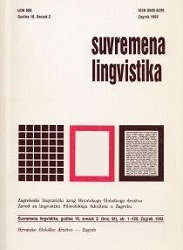
Review of: Herbert L. Colston, How Language Makes Meaning: Embodiment and Conjoined Antonymy, Cambridge University Press, 2019.
More...
Review of: Marko Kapović, Gramatika španjolskog jezika, Matica hrvatska, Zagreb, 2022.
More...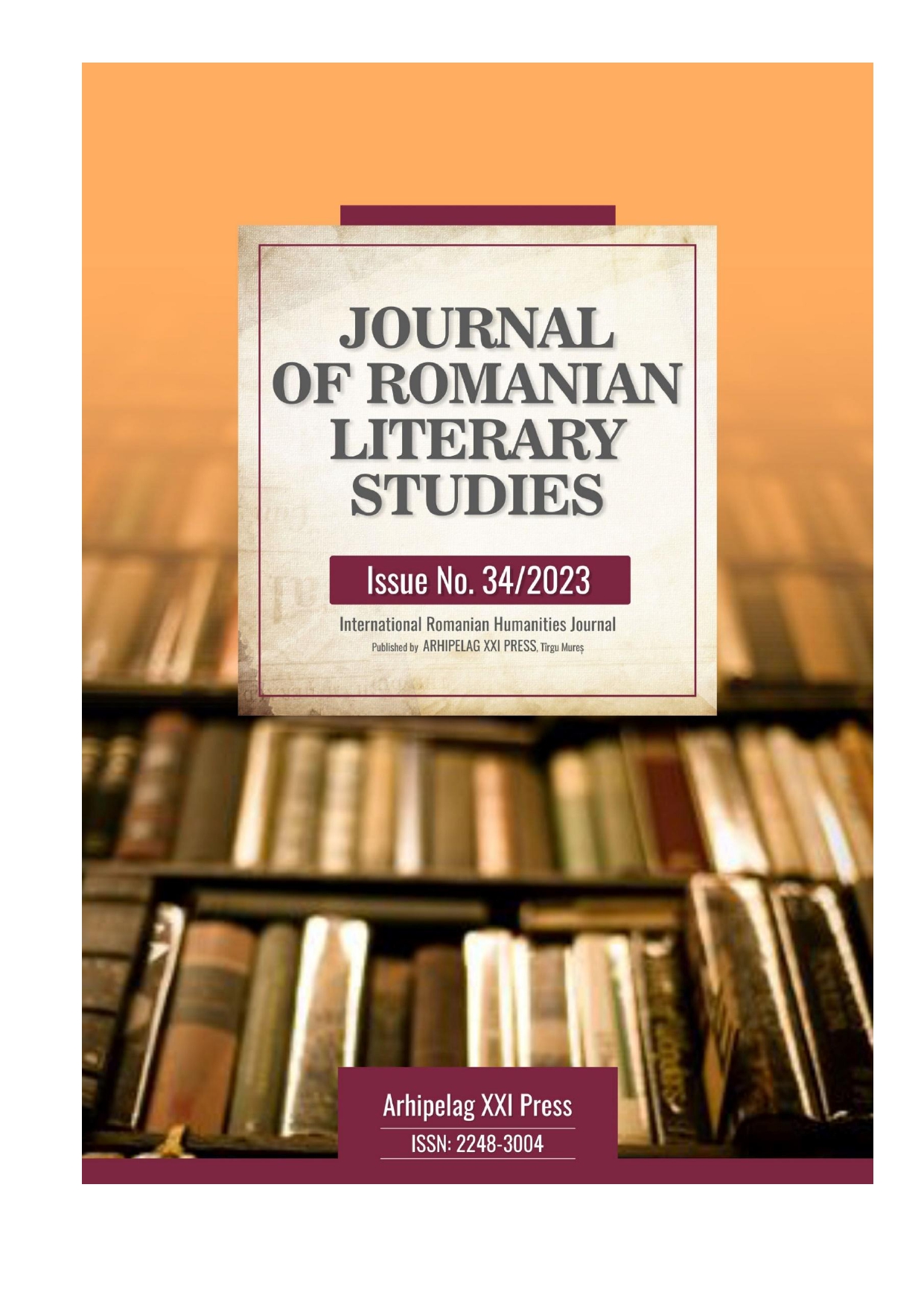
The process of biblical translation could be a very daunting task because of its countless semantic and syntactic variations. This paper begins by discussing the notion of translational equivalence, proposed by philologian Eugene Nida, which underpins all work on morph-syntactic biblical area. Then I apply this scientifical methodology to some mariological biblical texts that involves the supernatural birth of Christ (Matthew 1:18a – translational dilemma of adversative δέ) and perpetual virginity of Mary (Matthew 1:25a – translational dilemma of preposition ἕως). The use of the greek ἕως – english „till” – romanian „până” does not imply that Joseph had marital relations with Mary after the Savior’s birth. In the Bible, this preposition is often used to express a situation that actually continues after the event mentioned (Gen. 8:7; Deut. 34:6; 2Kings 6:23; Matthew 28:20).
More...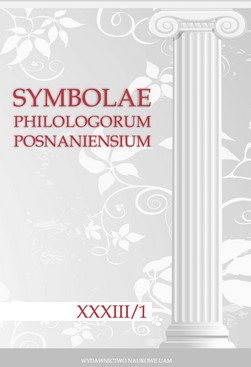
This paper deals with the linguistic aspect of tragic irony in the Oedipus Rex. It begins with the observation that several ambiguous expressions in the play telegraph their double meaning through various kinds of linguistic slips. It is argued that these slips occur on three distinct levels: semantics, syntax and pragmatics. There follows an analysis of several examples under each of these three headings. The paper concludes with the observation that when it comes to the question of Oedipus’ familial relationships and the legitimacy of his rule in Thebes, language itself fails the hero and defies his attempts at controlling it.
More...